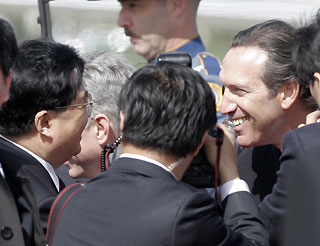Although the two countries also have a number of
differences, the spokesman said, the US-Chinese relationship "has moved forward
and matured to a point where we can speak openly and candidly about those
disagreements."
|

President Hu Jintao (L) greets
Starbucks' CEO Howard Schultz (R) after arriving at Paine Field in
Everett, Washington, April 18, 2006. [Reuters] |
|
|
Yuan Peng, a researcher at the China Institute of Contemporary International
Relations, said the summit would allow the two leaders to discuss how to
establish a more stable strategic framework to ensure healthy and peaceful
development of bilateral ties.
As Sino-US ties show signs of maturing, increased co-operation does not hinge
on just one summit, Yuan told China Daily.
The Hu-Bush summit will focus on economic and trade frictions among other
issues, predicted Zhu Feng, an expert on Sino-US relations at Peking University.
China is the third-largest trade partner of the United States, which is the
second largest of China. However, the two countries have some frictions in the
economic and trade sectors, ranging from the exchange rate of renminbi and the
US trade deficit with China to IPR protection.
"The two leaders now face a new challenge: Whether or not economic and trade
frictions will hinder the advancement of political relations," Zhu said.
China has shown its strong resolve to push forward economic and trade
co-operation, said Zhu, citing the recent signing of agreements to buy products
and commodities worth more than US$16 billion.
It is also important for the US administration to assure China that economic
frictions will not block the progress of political ties, he said.
The researcher said the two countries should co-ordinate efforts in handling
nuclear issues in Iran and the Korean Peninsula and in the anti-terrorism
campaign.
On the question of Taiwan, the assurance by the US side on the one-China
policy is not enough and the two countries must boost their co-operation to
oppose and contain "Taiwan independence," which is beneficial to both sides,
according to Zhu.
David M. Lampton, director of China Studies at Nixon Centre, said in an
article published in the People's Daily on Monday that Hu's visit will "assist
Americans to better understand the complexities of China's circumstances at the
same time that he is exposed to the very real human problems Americans face."
"Leaders in America often follow public opinion. If the American people
better understand China, their leaders will act on this improved understanding,"
he said.
Besides the United States, Hu will also visit Saudi Arabia, Morocco, Nigeria
and Kenya from April 22 to April 29.